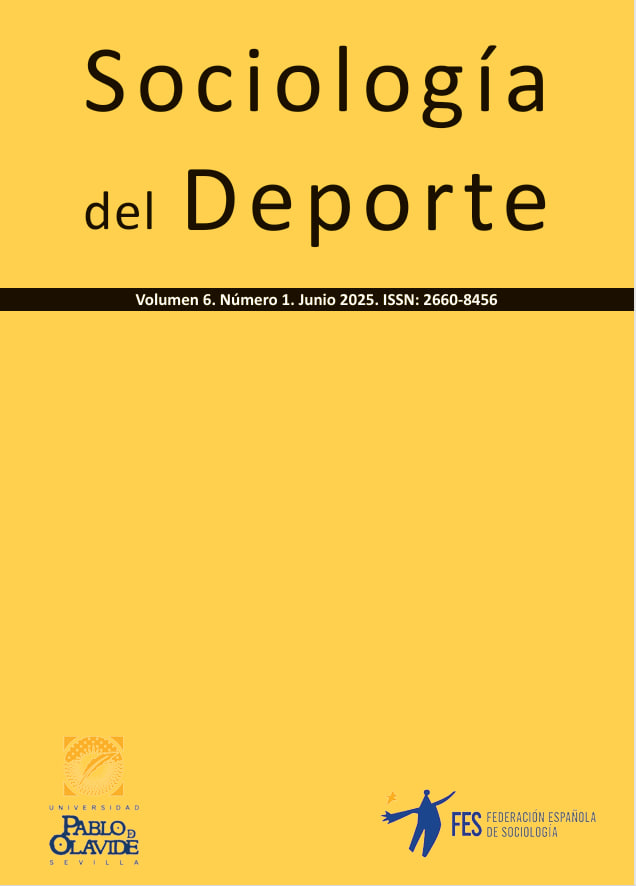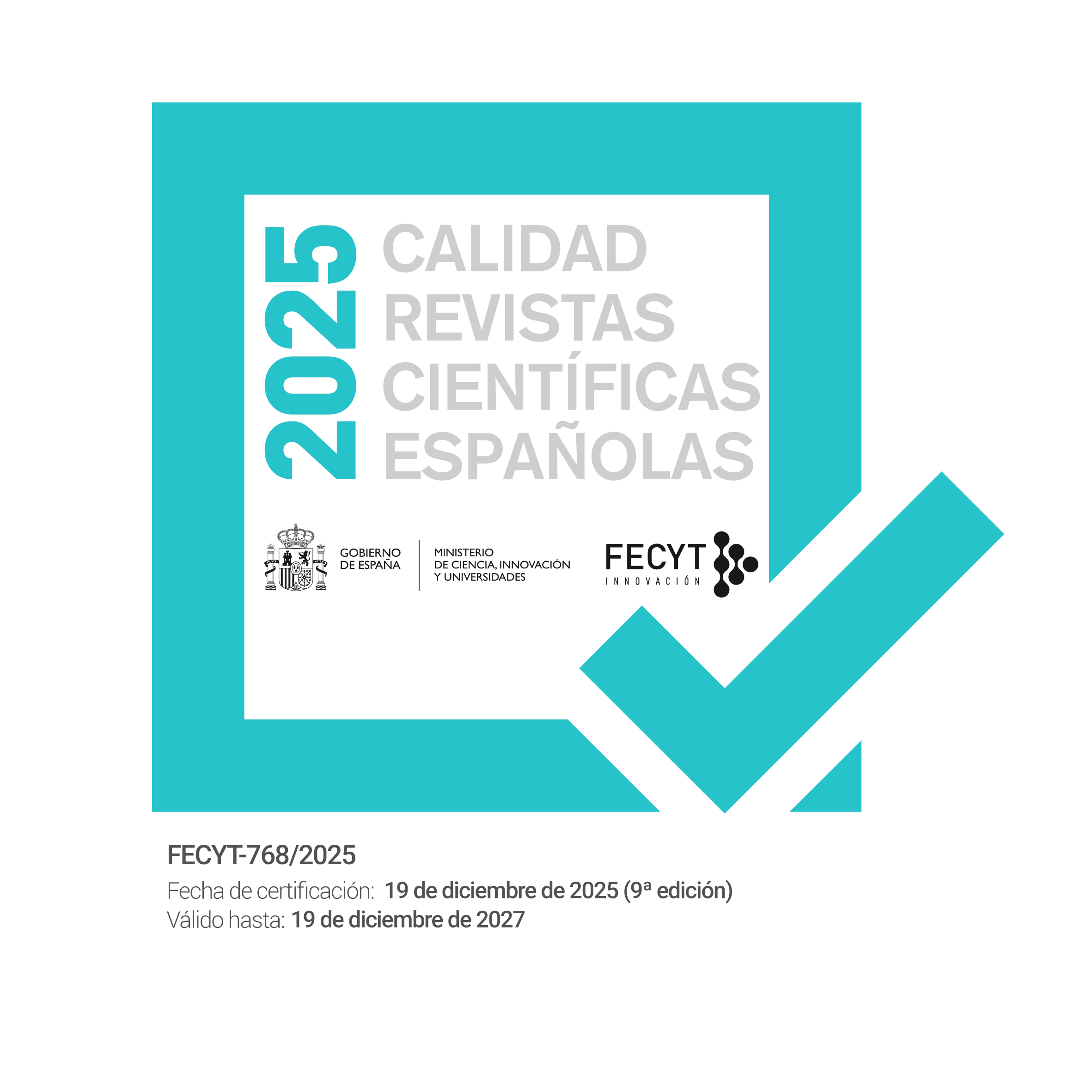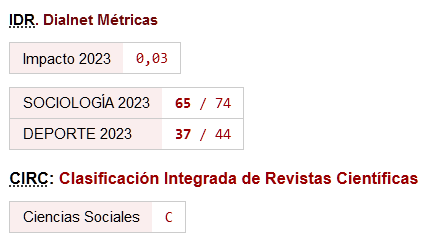La percepción de ajedrecistas expertos sobre las trampas en ajedrez online.
DOI:
https://doi.org/10.46661/socioldeporte.11708Palabras clave:
Ajedrez, Trampas, Experimento de campo, Expectativas performativas de interacciónResumen
Las trampas en ajedrez se han convertido en una preocupación importante con la llegada de tecnologías avanzadas, en particular la inteligencia artificial. Este artículo presenta los hallazgos parciales de un proyecto más amplio que investiga las complejidades de las trampas en el ajedrez sobre el tablero y en línea (online). Por tanto, sólo analiza los resultados de un experimento de ajedrez online con 24 jugadores expertos. Los hallazgos exploran las condiciones bajo las cuales surgen las sospechas, los argumentos a favor y en contra de tales acusaciones y las tácticas empleadas por los ajedrecistas que podían contar con ayuda externa (realizar trampas) durante el experimento.
Descargas
Citas
Anderson, Ashton, Kleinberg, Jon y Mullainathan, Sendhil. 2016. Assessing human error against a benchmark of perfection. KDD, 705-714. New York: Association for Computing Machinery.
https://doi.org/10.1145/2939672.2939803
Barnes, David J., y Hernandez-Castro, Julio. 2015. On the limits of engine analysis for cheating detection in chess. Computers and Security, 48, 58-73.
https://doi.org/10.1016/j.cose.2014.10.002
Biswas, Tamal & Regan, Kenneth. 2015. Measuring level-k reasoning, satisficing, and human error in game- play data. En 2015 IEEE 14th International Conference on Machine Learning and Applications (ICMLA), 941-947.
https://doi.org/10.1109/ICMLA.2015.233
Bourdieu, P. (2008). El sentido práctico. Madrid: Siglo XXI.
Chess.com. 2024. "Fair play on chess.com." 7 Febrero. https://www.chess.com/fair-play#fair- play-numbers.
Ermisch, John, Diego Gambetta, Heather Laurie, Thomas Siedler & Noah Uhrig.2009. Measuring people's trust. Journal of the Royal Statistical Society Series A: Statistics in Society, 172(4), 749-769.
https://doi.org/10.1111/j.1467-985X.2009.00591.x
García, Leontxo. 2021. Ajedrez y ciencia, pasiones mezcladas. Barcelona: Crítica.
Garfinkel, Harold.1963. A Conception of, and Experiments with, "Trust" as a Condition for Stable Concerted Actions. En O.J. Harvey (ed.) Motivation and Social Interaction (pp. 187-238). Ronald Press.
Goffman, Erving.1969. Strategic interaction. Philadelphia: Univ. Pennsylvania Press.
Goldowsky, Howard.2014. How to catch a chess cheater. Chess Life, Junio, 22-30.
Kasparov, Garry.2017. Deep Thinking. London: John Murray
Kim, Jaeha & Shin, Davin. 2023. Chess Surges in Popularity Post-Pandemic. The Echo, 27 de abril https://thetenaflyecho.com/19255/arts-entertainment/chess-the-resurgence-of-
the-game/
Laarhoven, Thijs, y Ponukumati, Aditya. 2022. Towards transparent cheat detection in online chess: An application of human and computer decision-making preferences. En International Conference on Computers and Games, 163-180. Cham: Springer Nature.
https://doi.org/10.1007/978-3-031-34017-8_14
Patria, Reyhan, Favian, Sean, Caturdewa, Angoro, Suhartono, Derwin. 2021. Cheat detection on online chess games using convolutional and dense neural network. En 2021 4th International Seminar on Research of Information Technology and Intelligent Systems (ISRITI), 389- 395.
https://doi.org/10.1109/ISRITI54043.2021.9702792
Robinson, Joshua & Beaton, Andrew. 2020. The Real Queen's Gambit: Catching Chess Cheaters. The Wall Street Journal. 8 Diciembre 2020. https://www.wsj.com/articles/the-real-queens-gambit-catching-chess-cheaters-11607439491.
Sánchez García, Raúl & Fele, Giolo.2015. Normatividad en deporte: una reespecificación etnometodológica. Empiria. Revista de Metodología de las Ciencias Sociales, (30), 13-31.
https://doi.org/10.5944/empiria.30.2015.13883
Stark, David. 2011. The sense of dissonance: accounts of worth in economic life. Princeton Univ. Press.
Svensen, Tarjei, J. 2025. "2024 Year In Review". Chess.com, 18 febrero https://www.chess.com/article/view/year-in-review-2024
Turowetz, John & Rawls, Anne W.2021. The development of Garfinkel's 'Trust'argument from 1947 to 1967: Demonstrating how inequality disrupts sense and self-making. Journal of Classical Sociology, 21(1), 3-37.
https://doi.org/10.1177/1468795X19894423
Velasco, Honorio M., Ángel Díaz de Rada, Francisco Cruces, Roberto Fernández, Celeste de Madariaga & Raúl Sánchez. 2010. La sonrisa de la institución: confianza y riesgo en sistemas expertos. Editorial Universitaria Ramón Areces.
Watson, Rod.2009. Constitutive practices and Garfinkel's notion of trust: Revisited. Journal of Classical Sociology, 9(4), 475-499.
https://doi.org/10.1177/1468795X09344453
Zaksaitė, Saloméja. 2020. Cheating in chess: a call for an integrated disciplinary regulation. Kriminologijos studijos, 8, 57-83.

Descargas
Publicado
Cómo citar
Número
Sección
Licencia
Derechos de autor 2024 Raúl Sánchez García, Héctor Laiz-Ibanez

Esta obra está bajo una licencia internacional Creative Commons Atribución-NoComercial-CompartirIgual 4.0.









